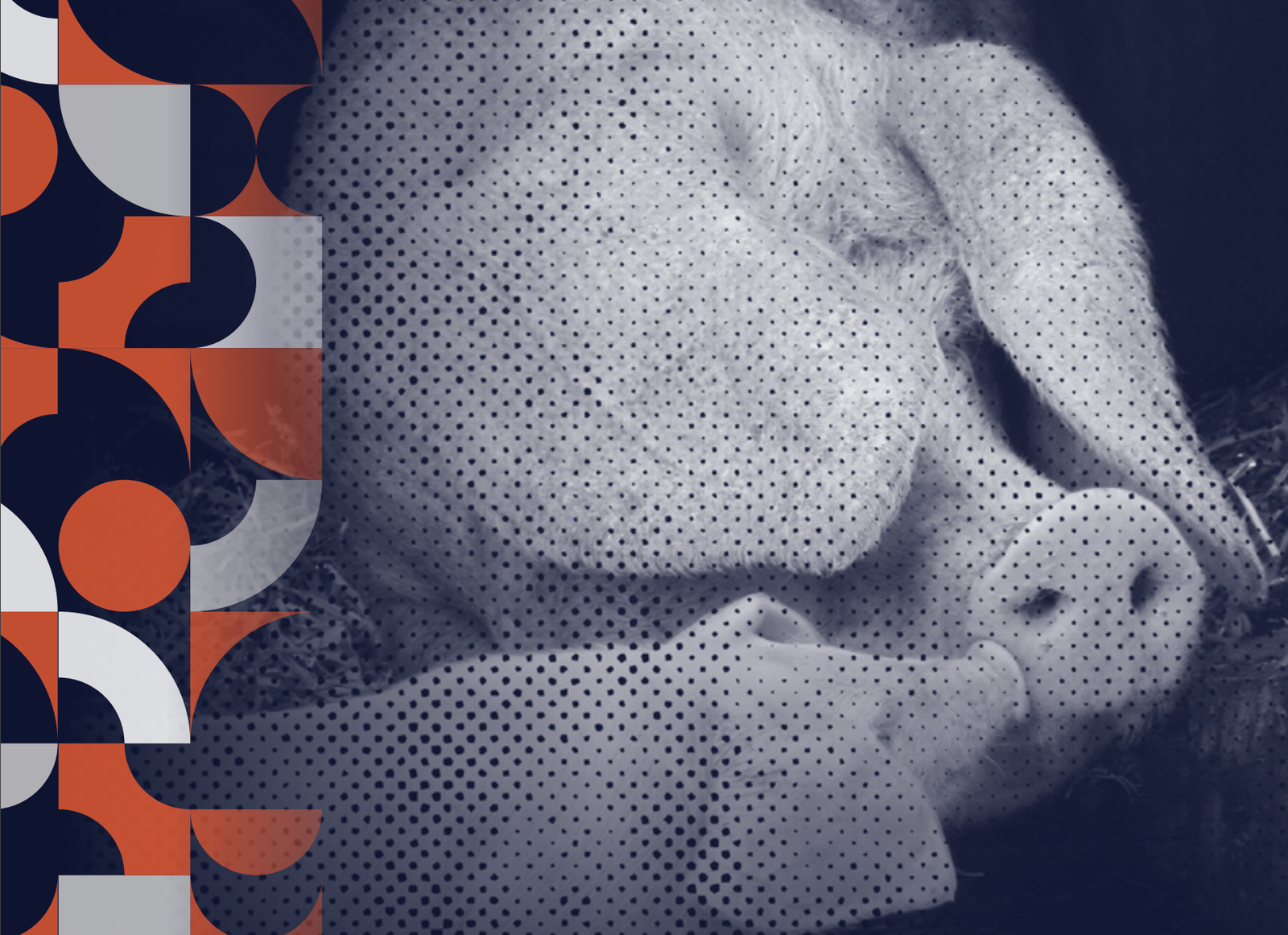Report aims to monitor the progress of large companies publicly committed to implementing sustainable animal welfare practices in pig farming.
São Paulo, November 2023 – Alianima, a non-profit animal protection organization, announces the launch of the 4th edition of the Swine Observatory. The report, which is published annually, tracks the progress of large companies in the sector that are publicly committed to implementing animal welfare policies.
• Check out the full report here.
Pig farming in Brazil
Brazil stands out on the global pig farming scene and ranks fourth among the world’s largest pork producers and exporters, behind China, the European Union and the United States. In 2022, the country reached a production of 4.9 million tons, which means an increase of 6% compared to 2021. Of this total, around a quarter was destined for export to more than 80 countries.
Regarding the domestic market, pork consumption per person was approximately 18 kg in 2022, representing an increase of 7.8% over the previous year, according to data provided by the Brazilian Animal Protein Association (ABPA).
Animal welfare practices in pork production systems are essential because, in addition to improving the quality of life of the animals, they maintain Brazil’s competitiveness on a global scale. An example of this type of good practice is the ban on the use of crates during pig gestation. Several countries such as Norway, New Zealand, Sweden, Switzerland, the United Kingdom and some states in the United States no longer allow this.
“Consumers are increasingly aware and concerned about the products they buy and consume with their meals, demanding transparency from the industry in relation to the treatment of animals,” says Patrycia Sato, president and technical director of Alianima.
Swine Observatory 2023 Report
This year, 29 companies were contacted, 7 of them suppliers, which are the companies directly involved in the production and processing of pork, and 22 customers, such as restaurants and retailers, who purchase pork from these suppliers. Six companies on the customer list were contacted for the first time to take part in the Pork Observatory.
Compared to the previous year, the report showed an increase of 26.1% in relation to the companies approached in 2022, an increase that was due to the publicly announced commitments of the client group, which reflects more seriousness and corporate commitment to the issue.
In the group of suppliers, Brazil’s largest meatpackers took part in this year’s Observatory: Alegra Foods – Castrolanda; Aurora Coop; BRF S.A. (Sadia and Perdigão); Seara (JBS) and Pamplona Alimentos S.A. Frimesa Cooperativa Central and Pif Paf Alimentos S.A were also approached but did not respond.
Among the clients: Arcos Dorados (McDonald’s); B.LEM Padaria Portuguesa; Brazil Fast Food Corporation – BFFC (Bob’s); Dídio Pizza; Forno de Minas; GPA (Pão de Açúcar, Extra and Compre Bem); Grupo Carrefour Brasil (Atacadão, Carrefour, Sam’s Club, Nacional, Super BomPreço and TodoDia); Grupo Dia; Hippo Supermercados; Hotel Unique; Marfrig Global Foods S. A. A; Bloomin’ Brands (Outback Steakhouse and Aussie Grill); Burger King; Casa do Pão de Queijo; Ciao Pizzeria Napoletana; Grupo Madero; Grupo Trigo (formerly TrendFoods – Gendai and China in Box); Halipar (Griletto, Montana Grill, Jin Jin and Croasonho); Monster Dog; St. Marché; Subway and UnidaSul were also approached but did not take part.
Banning gestation crates for sows and migration to group stalls
As far as the transition to the end of gestation crates is concerned, the progress made by suppliers is noteworthy, even if there are difficulties pointed out by the sector. This progress can be justified both by requests from animal organizations and by the effect of Normative Instruction No. 113 (IN 113/2020), in force since 2021, which establishes good animal handling and welfare practices on commercial pig farms.
As for the customers, the clarifications and the progress of the transition are positive, but there is a deficit in the technical mastery of the subject, including the other aspects of animal welfare and Single Health that were asked about.
Use of antimicrobials in pig farming
Pig farming is the sector that uses the most antimicrobial drugs (antibiotics and chemotherapy), as it consists of more restrictive environments with a high density of animals, conditions that facilitate the transmission of diseases and tend to cause a drop in immunity due to stress.
Although it is a natural phenomenon for microorganisms (bacteria, fungi, viruses and other parasites) to adapt, the development of resistance to antimicrobials is accelerating as a result of the indiscriminate use of these drugs. As a result, antibiotics and other antimicrobial drugs become ineffective and infections become increasingly difficult or impossible to treat.
In this way, Alianima highlights the importance of World Antimicrobial Resistance Awareness Week, a campaign created by four organizations – the Food and Agriculture Organization of the United Nations (FAO), the United Nations Environment Programme (UNEP), the World Health Organization (WHO) and the World Organization for Animal Health (WHOA) – which reinforces the dissemination of best production practices to prevent the occurrence and spread of resistant infections and reduce the use of antimicrobials.
There has been progress, especially on the part of Arcos Dorados, Dídio Pizza and Marfrig, which have started to demand an end to the non-therapeutic use of antimicrobials by their suppliers. Also noteworthy for their progress are B.LEM, Bob’s, Forno de Minas and Hippo Supermercados, which, unlike in the previous edition, have now responded that they aim to address this topic with suppliers. Hotel Unique was the only company to respond that does not intend to do so.
“On the suppliers’ side, it was good to see that the majority do not use these drugs as growth promoters, and that some are already planning to ban prophylactic and even metaphylactic use. We need to test the alternatives, which have already been used, in order to effectively replace antimicrobials. As far as customers are concerned, the result was also positive, since most of them intend to demand that their suppliers stop the non-therapeutic use of these drugs, given that they also have a responsibility for food quality and safety in the context of One Health,” Patrycia concludes.
Check out all the material from the 4th edition of Observatório Suíno on the landing page http://observatoriosuino.com.br/



